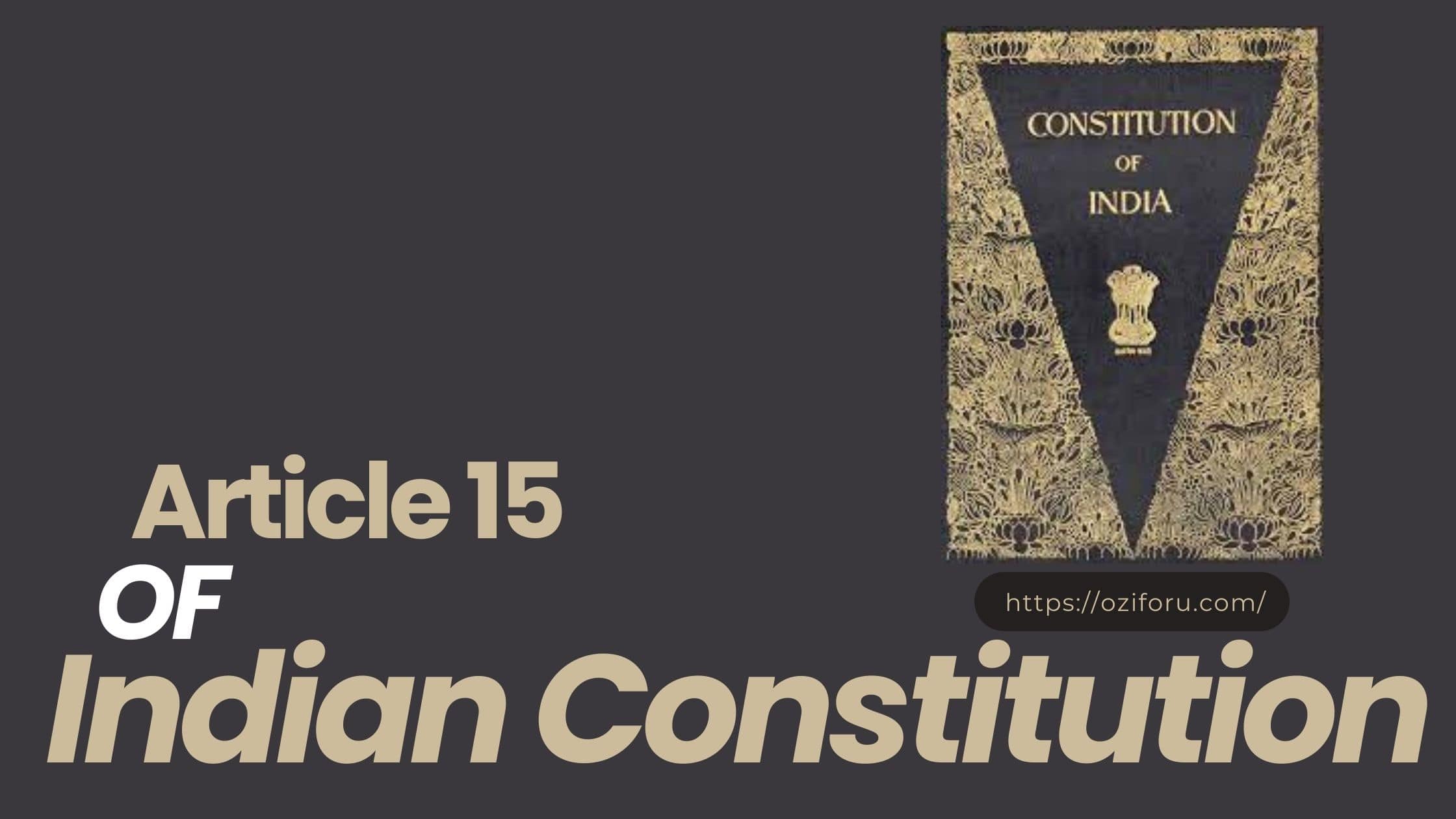Learn What Is Article 15 Of Indian Constitution Easily. India is a secular, democratic, and republic country, in which such a constitution has been framed, which takes special care of every section of the country and does not allow any kind of discrimination or injustice, and in this direction, the constitution Amendments also happen from time to time. In the Constitution of India, there is Article 15 under the third part, which is related to the fundamental rights and rights of equality of the common residents of the country.
Read Specific Paragraph
What Is Article 15 Of Indian Constitution?
Article 15 in the constitution has been made to eradicate any kind of discrimination in the country. In this, all equal rights have been given to the person irrespective of religion, caste, color, gender, or place of birth. However, keeping in mind the social and educational development in the country, some special provisions can be made for backward classes and women.

To understand this, the definition of the fundamental rights of Indians is also required, because these articles do not only protect the fundamental rights but in case of violation of the fundamental rights in these rights, the judgment given by the Supreme Court or in certain Some amendments have been made in this article even after the passage of the resolution in the House to protect these rights.
Also Read: HDFC Bank Rent Your Property
What Are Fundamental Rights?
- Fundamental rights are those rights of Indian citizens, which give them the right to lead an independent, autonomous life in the country. Articles from Articles 12 to 35 in the third part (Part III) of the Constitution, all those articles have been made to protect the rights of the individual, including equal law, freedom of expression, religious and cultural freedom, and peaceful association. Freedom includes the freedom to practice any religion.
- Fundamental rights are valid for all the citizens of the country, irrespective of their color, wherever they are born, caste, gender, or religion, if the fundamental rights of any citizen in India are violated If it happens, he can file a petition against it in the Supreme Court for justice. The definition and principles of fundamental rights in the Constitution of India have been influenced by various countries and their constitutions, which include the Bill of Rights of England, the Bill of Rights of the United States, and the Declaration of the Rights of Men of France.
What Is Article 15 Of Indian Constitution | History and Structure?
Article 15 (whose draft was Article 9) in the Constitution of India was discussed on 29 November 1948 in the Constituent Assembly. The assembly was not unanimous on this draft and wanted some modifications. Some said that there was no talk of discrimination on the grounds of family and lineage in this draft, while some wanted parks, roads, and tramways for the common people. On the basis of these points, some space was kept in the draft article.
In fact, the language used in the article generalized to public places, in addition to the clauses in the draft article making special provisions for women and children, similarly proposing for Scheduled Castes and Scheduled Tribes, arguing that This approach will end the separatism with SC and ST. Articles 15(1), (2a) and (2b), (3), were implemented as per the 1949 Constitution of India.
READ MORE: Chai Sutta Bar Franchise Cost
What Is Article 15 Of the Indian Constitution | Structure?
Article 15 (1): According to this, the state shall not discriminate against any citizen on grounds of religion, color, caste, sex, place of birth, or any of these grounds.
Article 15 (2a): On the basis of religion, color, caste, gender, or place of birth, any person will be stopped in a shop, hotel, restaurant, place of entertainment, or any other place.
Article 15 (2b): No person shall be prevented from using any well, stepwell, ghat, public resort, or any public place, whether maintained wholly by the State Government or partly contributed by the Government.
Article 15 (3): This article has been included in the Constitution of India to look into security-related matters, in which special care has been taken for the safety of women and children. Nothing in this article shall prevent the State from making special provisions for women and children.
Article 15(4): Nothing in this article nor in clause (2) of Article 29 shall prevent the State from making special provisions for the social and educational improvement and advancement of the Scheduled Castes and Scheduled Tribes. In this, the state has taken care of the education and social development of the backward classes of the society, scheduled castes, and tribes.
This clause was added to the Constitution in 1951 on the decision of the Supreme Court on the ongoing case between the State of Madras and Champakam Dorairajan.
Article 15 (5): The House had proposed Article 15 (5) in 2005, making 93 more amendments to the Constitution, according to which education to scheduled castes and tribes and socially and economically backward classes (Socially and Educationally Backward Classes-SEBS) In order to provide equal opportunities, reservation should be given in educational institutions. In this article, efforts have been made to empower the country with reservations for admission in educational institutions, educational institutions include all private, government, and semi-government institutions. In this article, only madrassas run by minority communities have been excluded.
This clause was added to the Constitution in 2006 in the 93rd Amendment. In this too, the decision of the Supreme Court on the case between PA Inamdar and the State of Maharashtra was influenced.
In this way, these are also similar to clauses 3 and 4, but here the rules are made according to the law and not made by any executive order, with this it is also true that Article 15 (3) and Article 15 (4) both provide for reservation in the country.
Article 15 (6): In January 2019, a proposal for the 103rd Amendment Act of the Constitution has been passed, in which Article 15 has been amended to 15(6). This article has been made for the admission of economically weaker sections in all educational institutions, whether aided or unaided by the state. These amendments have been done to give reservations to those people who were not included in Article 15(5) and Article (4).
READ MORE: 44 Va Samvidhan Sanshodhan
If You Like The Information Please Do Share.
FaceBook || Twitter || Instagram




